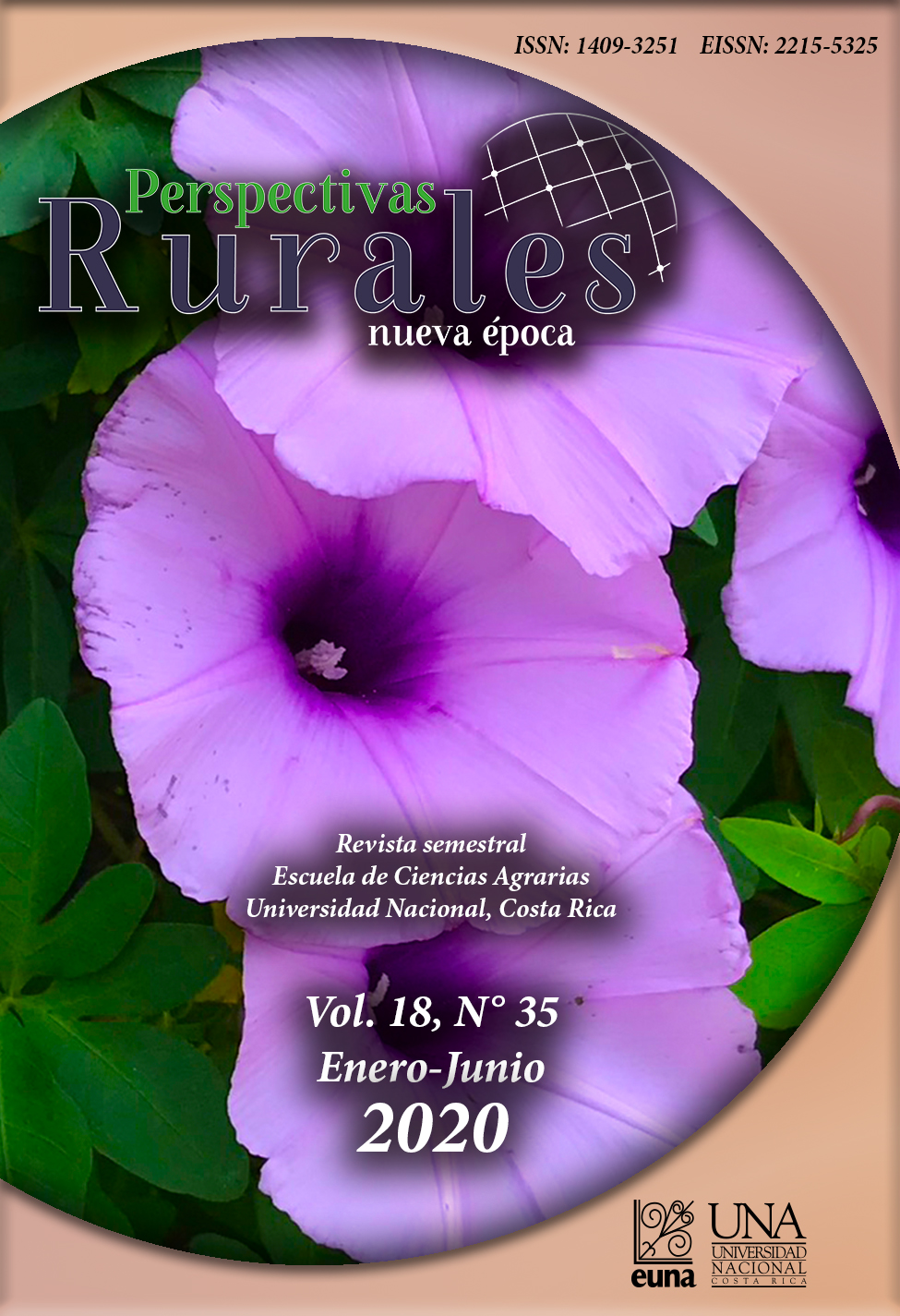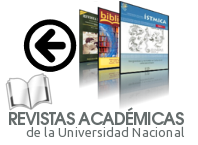Strengthening capacities for self-consumption in rural communities: The experience of an extension project of the National University, Costa Rica
DOI:
https://doi.org/10.15359/prne.18-35.6Keywords:
self-consumption, capacity building, participatory methodologyAbstract
At the National University of Costa Rica, there are several extension projects, which seek to generate a relationship between society and the university, in order to contribute to the joint development of communities. This is the case of the project called: “Management of Territorial Rural Development in three communities of the Canton of Sarapiquí”, which took place from 2018 to 2020. The communities that integrated the process were El Roble de La Virgen, Cureña and La Rambla. These three communities have characteristics of rurality, low rates of social development, and various climatic conditions and contexts that were addressed for capacity building.
This article integrates the axes of food security/sovereignty and local capacity building, through a series of training for the improvement of self-consumption capacities in the area of edible gardens. The workshops carried out resulted inthe participants learning about the need to make certain changes in their habitats. This could be seen through an instrument applied to know the habits of the protagonists, who were mostly female. Women mentioned that they bought their vegetables in the local greengrocery stores and were willing to learn how to produce their own vegetables at home, with the improvement from the socioeconomic point of view that this can mean. The most liked products are green lettuce, sweet pepper, coriander, beetroot, celery, and chives.
It was possible to create a capacity building space, with the well-known Edible Gardens, which allowed to reuse of materials that would otherwise be wasted. This activity can serve as an alternative therapy, and to help people get some of their food in a healthy and clean way.
The University has a responsibility to be a process facilitator, as part of the academic work, to contribute to the strengthening of communal capacities, considering the environment and local knowledge, adapting the methodologies to the different needs for a community approach focused on participatory actions.
that are present in one and between the different counties. In addition, action lines are established to improve DHL, which were validated with local actors.
References
Altieri, M.A.; Nicholls, C. I.; Henao, A.; & Lana, M. (2015). Agroecology and the design of climate change-resilient farming systems. Agronomy for Sustainable Development, 35, 869–890. doi: 10.1007/s13593-015-0285-2
Área de Conservación Tortuguero, Agencia de Cooperación Internacional del Japón, y Ministerio de Agricultura y Ganadería. (2017). Guía técnica para la difusión de Tecnologías de Producción agropecuaria sostenible en Fincas Integrales. (1ª ed., Vol. 8).
Carrillo, S. y Robles, A. (2019). Diagnóstico Fortalecimiento del Tejido Organizacional en la comunidad La Rambla, Sarapiquí. Heredia, Costa Rica. Escuela de Planificación y Promoción Social, Universidad Nacional.
Centro de Atención Médica Naturista. (2004). Cómo gozar de buena salud. (10ª ed., Vol. 3). Plasarte, C.A.
Cubero, K. y Marín, A. (2018). Diagnóstico Comunidad La Rambla. Escuela de Planificación y Promoción Social, Universidad Nacional.
Food and Agriculture Organization of the United States. (s.f). Los diez elementos de la Agroecología. http://www.fao.org/agroecology/knowledge/10-elements/es/
Food and Agriculture Organization of the United States. (2011). Ahorrar para Crecer: Guía para los responsables de las políticas de intensificación sostenible de la producción agrícola en pequeña escala. http://www.fao.org/3/I2215S/i2215s.pdf
Gliessman, S. R. (2002). Agroecología Procesos Ecológicos en Agricultura Sostenible. CATIE.
Gliessman, S. R. (2017). Agroecología para la Seguridad Alimentaria y Nutrición. En Actas del Simposio Internacional de la FAO. http://www.fao.org/3/a-i4729s.pdf
Gómez, M. y Rettes, M. (2018). Caracterización comunitaria: El Roble, La Virgen, Sarapiquí, Heredia. Escuela de Planificación y Promoción Social, Universidad Nacional.
González, R. (2013). Huerta casera, manual de hidroponía popular. EUNED.
González, R. (2019). Huerta casera: Manual de Hidroponía Popular. (4ª ed.). EUNED.
Gordillo, G. y Méndez, O. (2013). Seguridad y Soberanía Alimentaria. (Documento base para discusión). Organización de las Naciones Unidas para la Alimentación y la Agricultura. http://www.fao.org/3/a-ax736s.pdf
Marín, S. y Castro, M. (Eds.) (2005). El Huerto Orgánico Escolar. Programa Nacional de Agricultura Orgánica, Ministerio de Agricultura y Ganadería. Imprenta Nacional.
Paredes-Guzmán, G.R. y Forero-Palomino, P.A. (2018). Productos agrícolas para implementar huertas caseras en Altos de Cazucá, Soacha. Ciencia y Agricultura,15(2),39-45. http://doi.org/10.19053/01228420.v15.n2.2018.8394
Proyecto Humedales. (2015). Humedales de Importancia Internacional de Costa Rica. Heredia, Costa Rica. SINAC/PNUD.
Rojas-Hidalgo, I. y Daly-Duarte, C. (2019). Gestión participativa de capacidades para fomentar la producción agrícola ecoamigable en la comunidad escolar de Golfito en Cureña de Sarapiquí. En Sánchez, N. y Flores, M. (Comp.), Sistematización de experiencias: Desde el enfoque de gestión de capacidades, 97-112.
Secretaría Ejecutiva de Planificación Sectorial Agropecuaria, Ministerio de Agricultura y Ganadería. (2011). Política de Estado para el Sector Agroalimentario y el Desarrollo Rural Costarricense. http://www.cac.int/sites/default/files/Politica_de_estado_para_el_sector_agroalimentario_y_el_desarrollo_rural_costarricense.pdf
Vega-Naranjo, A. (2014). Caracterización territorio Sarapiquí. Instituto de Desarrollo Rural. https://www.inder.go.cr/sarapiqui/Caracterizacion-Territorio-Sarapiqui.pdf
Downloads
Published
How to Cite
Issue
Section
License
![]()
Revista Perspectivas Rurales. Nueva Época se encuentra bajo una licencia Creative Commons Reconocimiento-NoComercial-CompartirIgual 4.0 Internacional License.
Creado a partir de la obra en http://www.revistas.una.ac.cr/index.php/perspectivasrurales
Los autores/as que publiquen en esta revista aceptan las siguientes condiciones:
- Los autores/as conservan los derechos de autor y ceden a la revista el derecho de la primera publicación, con el trabajo registrado con la Licencia Creative Commons Atribución-NoComercial-CompartirIgual 4.0 Internacional, que permite a terceros utilizar lo publicado siempre que mencionen la autoría del trabajo y a la primera publicación en esta revista.
- Los autores/as pueden realizar otros acuerdos contractuales independientes y adicionales para la distribución no exclusiva de la versión del artículo publicado en esta revista (p. ej., incluirlo en un repositorio institucional o publicarlo en un libro) siempre que indiquen claramente que el trabajo se publicó por primera vez en esta revista.
- Se permite y recomienda a los autores/as a publicar su trabajo en Internet (por ejemplo en páginas institucionales o personales) antes y durante el proceso de revisión y publicación, ya que puede conducir a intercambios productivos y a una mayor y más rápida difusión del trabajo publicado.






